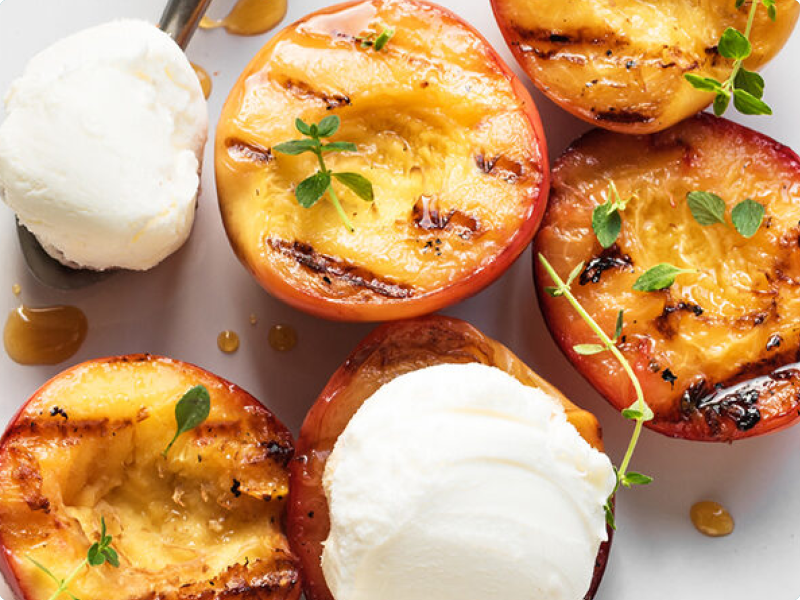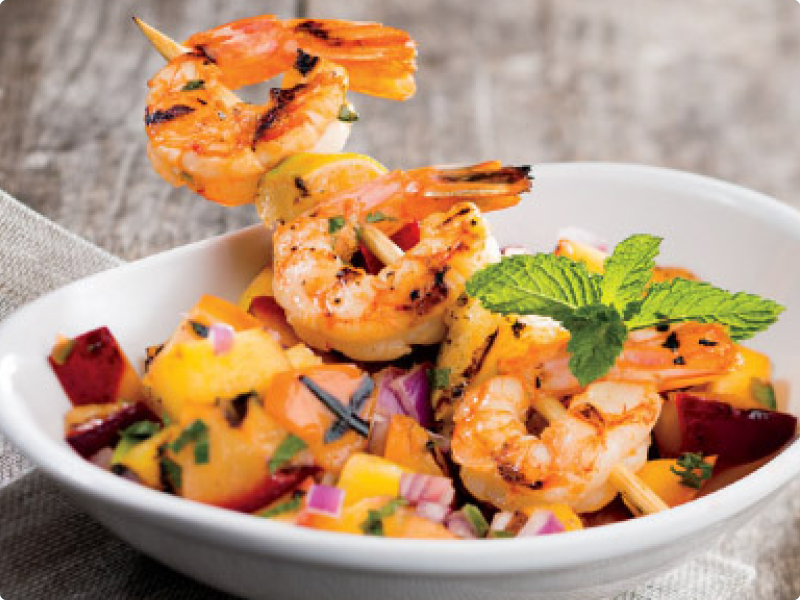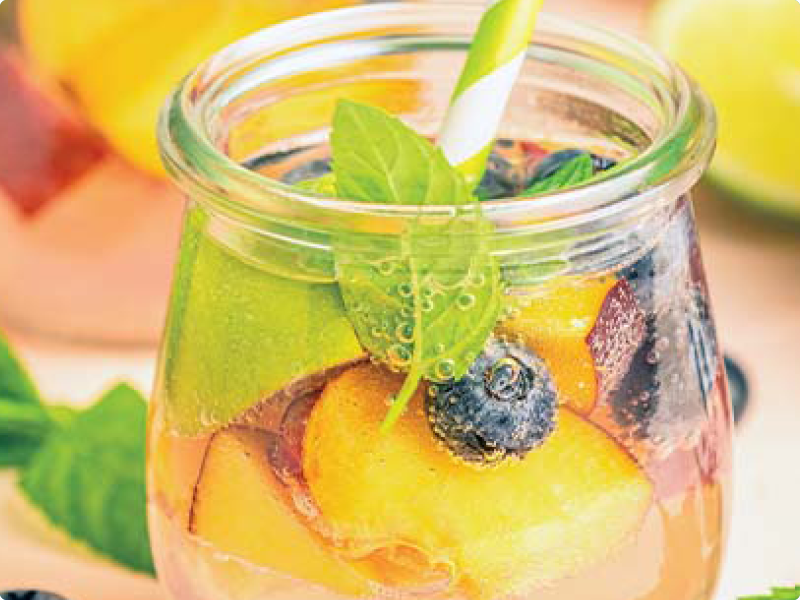Stone fruits – Summer Stars!
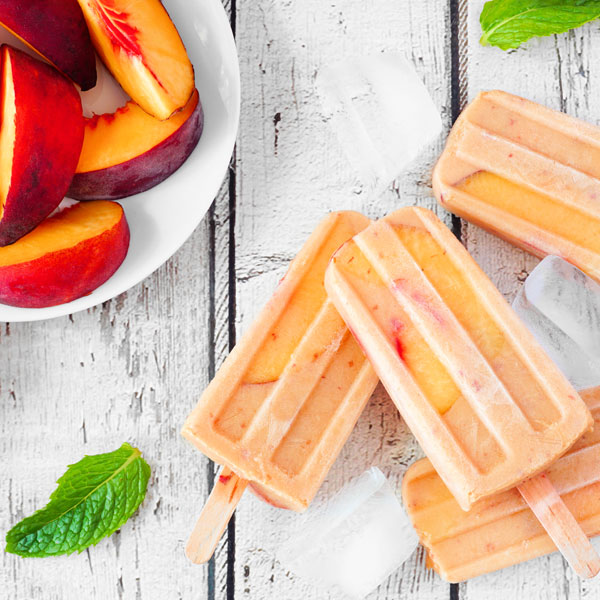
There is not much that can compare with the delightful experience of eating a perfectly ripe peach. The delicate aroma, velvety skin, and creamy, sweet, juicy flesh deliver an amazing moment of joy from first bite to last. You won’t mind the juice that runs down your chin – just savor the simple pleasure of one of nature’s amazing creations!
Peaches, in season in the USA during the summer, signal summer is here when they are featured in stores! Fresh from the Eastern Seaboard states of Georgia and South Carolina, peaches and nectarines, plums, and apricots are in beautiful displays in the Produce Department. Stone fruits are different members of the same plant family, or genus, Prunus. They are characterized by a hard pit center (the stone) surrounded by creamy flesh. They are also known as drupes. Peaches and nectarines are the same species, with just one gene changing the skin from velvet to smooth. Studies show peaches were cultivated as early as 6000 B.C., and they began to travel the world as the Eastern countries opened to Western traders, across Europe and the Mediterranean via Roman armies and brought by Spanish explorers to the Americas.
Wellness Benefits of Stone Fruits

Stone fruits have a variety of nutrients, and can be a good source of Vitamin C, Vitamin A, Fiber and Potassium. The rich color palate of the skin and fruit speak to content of bioactive compounds like polyphenols and flavonoids that are being researched to understand their exact benefit and action for health. Their delicious varieties, colors, flavors and textures make it easy to add benefit and bounty to snacks and meals, and truly enjoy the delicious benefits of eating more produce.
Popular Stone Fruits
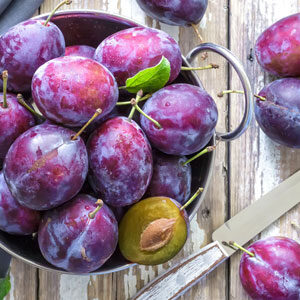
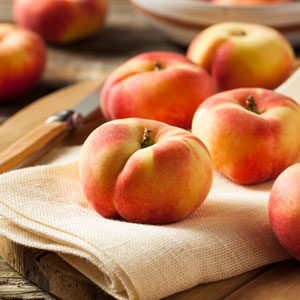
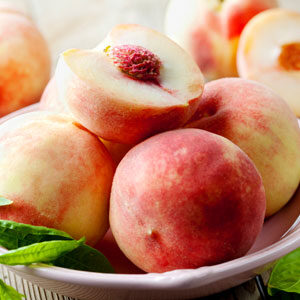
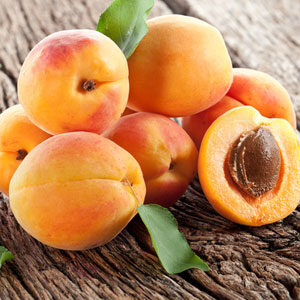
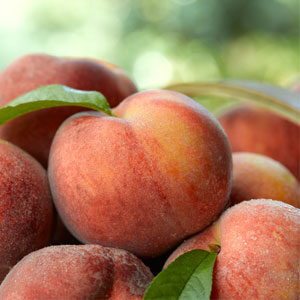






Variety is the spice of life!
So the saying goes! Our Produce Team has sourced the best of the best varieties of stone fruits for your culinary creations and enjoyment.
Southern Peach
Seasonal from late May to October, these peaches may be clingstone or freestone varieties. You will know when you bite into or slice it – the peach fruit “clings” to the stone, or pit, or comes away “freely”….you see what we did there? Both are sweet treats. Clingstones are usually yellow with a red blush near the stone, juicy and soft, wonderful for desserts, jams, and preserves. They are often used for canned products, like peach cups and fruit compote. Freestone are usually larger, a little firmer, and perfect for home canning, baking, grilling, salsas and parfaits.
White Peach
White-fleshed peaches are sweet and pretty in salads! They have yellow or red skins, so wonderfully contrasting and dramatic for fun recipe mashups (and great pictures!)
Saturn or Donut Peaches
These peaches are uniquely shaped, and remind you of the planet Saturn (the “planet” pit and fruit “ring”) or donuts, due to their flat or “oblate” shape with a center depression. They are small, and fun for kids and adults! They have tender, sweet yellow or white flesh, thin skins with just a little fuzz, and can be easily pitted (when ripe) by just poking the pit through the skin with your finger or the end of a wooden spoon. They are super quick to prep for recipes, the easiest of all being the classic – Peaches and Cream!
Peacharine
A yummy hybrid of peaches and nectarines, the Peacharine is a beauty – ripe, sweet, smooth, it can be used in place of any stone fruit in a recipe or eaten out of hand (maybe while sitting on a porch swing on a sunny afternoon….)
Yellow Nectarines/ White Nectarines
Nectarines are peaches without the velvety/fuzzy skin, and a slightly higher acid/tang flavor – that is the only difference! Like peaches, they have clingstone and freestone varieties, and a range of colors for both the skin and flesh. Fun baking idea – one tart recipe could use colors/varieties in patterns to create a (delicious) viral Instagram post!
Mango Nectarine
This gem of a fruit is the result of a happy accident – natural mutations of two heirloom, pale-skinned varieties, Mango Nectarines get their name from their golden color and tropical aroma and flavor. Exclusively grown in California, they have a very short season. They are amazing in a tropical fruit salad or fruit kabob, pitted/filled and baked like a baked apple, then served with ice cream, or sliced ripe and sprinkled with cayenne, as a salsa/topping for chicken or seafood. YUM!
Plum…delicious!
There are about 40 species of plums! They have a special place in history as well – evidence indicates that plums were the first cultivated fruit. They can be sweet or tart, with tender skin and soft, amber-yellow flesh. High in flavor and less than 50 calories each, plums are a good source of antioxidant Vitamin C, and smart snacking. Great for kids, they are just the right size for small hands. Plums are wonderful for cakes (and pancakes!), and easy to make into jam that can be used for a twist on thumbprint cookies, glazed grilled or roasted chicken or pork, and sauce for ice cream.
Apricots
Apricots are an excellent source of vitamin A&C, and a good source of potassium and fiber, and copper. Store apricots at room temperature until ripe, then refrigerate for three to five days. These little flavor and nutrient powerhouses are easy on their own or in a recipe. Chop them into salads and salsas, yogurt parfaits or chia seed pudding. Grill on a kabob with chicken and red pepper, or munch for lunch and enjoy a few bites of sunshine!
Pluots
Pluots are a cross between plums and apricots. Developed by cross pollination in California in the 1970s and 80s, there are now over 20 varieties. Explore them in all their pretty colors and delicious flavors! Price Chopper/Market 32 has ensured there is a lovely selection to choose from.
How to cook with Stone Fruits
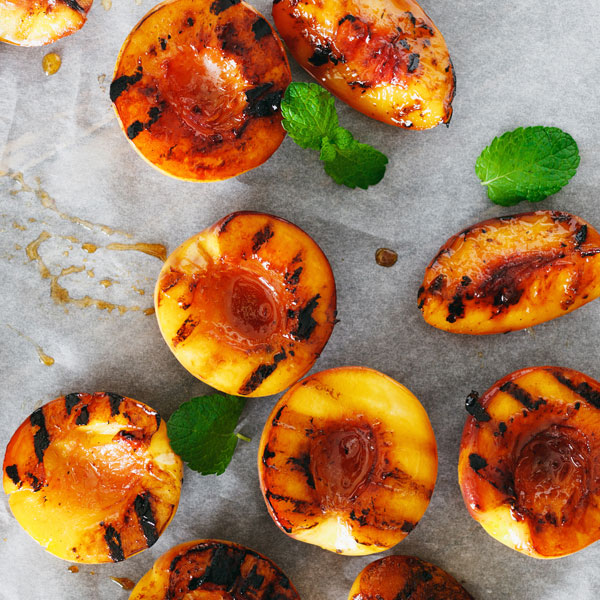
As recommended with all produce, wash thoroughly under cool running water before eating or preparing. Test ripeness by gently squeezing – fruit should give a little, and that softening will increase as it ripens. Slightly firmer fruit may be best for salsas, salads, PICKLES, grilling and yogurt parfaits, while riper fruits are fun for preserves, sauces, jams, chutneys, and muddling in beautiful beverages (check out some amazing recipes below!) Cobblers and fruit tarts can be made with any of these summer stars, and you will be a star too, when you bring a fresh-baked cobbler and vanilla ice cream to the summer get-together!
How to ripen – Place in a paper bag on a counter, at room temperature, until fruit gives slightly when squeezed.
Remove skin – Easily peel peaches and other stone fruits by bringing a medium-sized pot to a rolling boil, then putting whole peaches in for about 1 minute. Keep tongs and a towel/cutting board handy to place them on, slip the skins off once they have cooled to touch.
Rescue overripe fruit – Sometimes our intentions and our schedules don’t match up! If you find your stone fruit is overripe, no worries, there are some wonderful ways to use them up. Slice fruit into chunks on parchment paper-topped cookie sheet, and freeze/bag for use in smoothies. Puree fruit (with skin for nutrient and fiber benefits) in a blender or fruit processor, freeze in ice cube trays, make fruit leather in the oven, or dried fruit chips in the air fryer! Then add them to yogurt, ice cream, salads, oatmeal, rice or quinoa sides and salads….so versatile!
More Tasty Recipes to try
The secret to success? Make it before you make supper, so the peach flavor has time to infuse into the cream. Oh, my goodness!
- 1. Wash and slice fresh ripe peaches (one per person)
- 2. Place slices peaches into a glass bowl or dish
- 3. Sprinkle each peach with ½ teaspoon of PICS sugar
- 4. Add PICS light or heavy cream, enough to cover peaches
- 5. Refrigerate until served
Quick, fresh peach shortcake:
4 Price Chopper Bakery Biscuits
4 ripe, fresh peaches
1 container of PICS Whipped Cream
Wash and slice peaches into chunks. Slice biscuits in half. (Optional – microwave biscuits for 30 seconds to warm). Place 2 biscuit halves on one plate, and spoon peaches over both pieces. Top with whipped cream. (Lighter version – one biscuit half per serving.)
Done and delicious!
Beverage Bonanza
Beverages with botanical additions and infusions abound. Agua fresca, flavored iced teas (how about sun tea with peach ice cubes?), cocktails and mocktails are trendy and terrific. Wow friends at your girls night patio gathering, or make a super slushy for the kids on a hot summer day!
We Deliver in as Little as an Hour
We’ve partnered with Instacart to offer you the convenience of grocery delivery. Instacart’s network of personal shoppers will grocery shop for you and deliver your order directly to your doorstep so you can spend more time doing what you love.
Let us do the Shopping for you
Pick your items online and then pick them up at the store. You don’t even need to leave your car; our personal shoppers will bring your groceries to you. It’s that easy!



